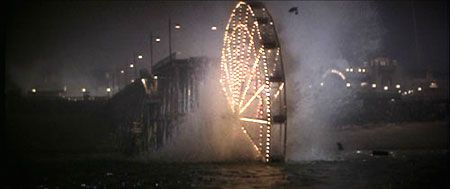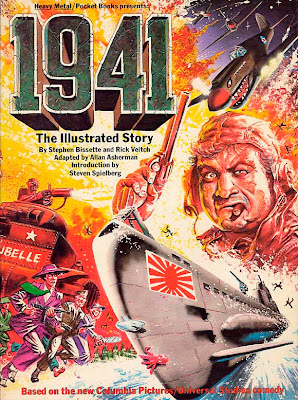I still remember the date: June 18, 1990.
Star Trek had killed off major, non-redshirt crew member characters before (Spock at the end of
The Wrath of Khan and Tasha Yar on
The Next Generation). But on that date,
The Next Generation looked like it was about to go a step further and actually write its captain off the show. What the hell was going on? Was Patrick Stewart's contract not renewed? Did he piss off the
Next Generation showrunner? Did he piss off someone from the Minoxidil Mafia?
June 18, 1990 was when
The Next Generation finally stepped out of the shadow of the original
Star Trek and proved at the end of "The Best of Both Worlds, Part I" that it was going to take certain
chances with its storytelling--or rather, boldly go where no
Star Trek incarnation had gone before. Sure,
The Next Generation had done a few excellent episodes before--
"A Matter of Honor," a standout hour where Riker temporarily serves on a Klingon ship, immediately comes to mind--but "The Best of Both Worlds, Part I" upped the ante with an especially tense hour full of possible changes to the show's status quo and moments of Starfleet being under attack in ways that hadn't been seen since
Star Trek IV: The Voyage Home.
On the old
Star Trek, the
Enterprise's most powerful antagonists, whether it was a starship-devouring machine or an actual god, would always be defeated or outwitted by the
Enterprise crew in less than an hour. But the Borg, which the
Enterprise-D first encountered a year before in "Q Who," were so powerful and unstoppable during "The Best of Both Worlds, Part I" that they clearly weren't going to be put down at the end of act five, especially after they transformed Captain Picard into one of them and assimilated his skills as a commander and his knowledge of Starfleet so that they could now attack the fleet's weaknesses. And it all ended with the most memorable final line in a
Star Trek story--Riker saying, "Mr. Worf, fire"--until Picard's "Five-card stud, nothing wild... and the sky's the limit" line at the end of
The Next Generation's final episode, that is.
It was one hell of a way to start the summer. I really thought "The Best of Both Worlds" was going to resume the following September with Picard floating around in a white robe and playing a golden Vulcan harp. A few discussions of the impact of "The Best of Both Worlds" have tended to say, "This was before the Internet, so over the summer,
Next Generation viewers shared their excitement over the cliffhanger in the most old-fashioned ways: over the watercooler, phone chats, the convention at the Ramada, telegrams, carrier pigeons..." But because these are
Star Trek fans we're talking about here, many of them have always been computer-savvy, and the ones who were the most computer-savvy were actually ahead of everyone else communication-wise in 1990 when they speculated over Picard's fate on things called BBSes. Remember those?
Once in a while, a really juicy mystery comes along in the summer and rocks the pop culture world. In 1990, it was "Is Riker going to kill Picard?" In 2010, it was "Is Leonardo DiCaprio still in the dream world? Because that damn top wouldn't stop spinning!" Summer's supposed to be the time for dumb blockbusters and breezy escapism, not thought-provoking and dystopian narratives. So thanks a lot,
Mr. Robot, for ruining the summer with your hacktivist leanings, your mistrust of corporations, your frustrations with economic inequality, your moral ambiguity, your clever use of (often moody) music, your unreliable narrator who can't tell apart reality from his imagination and your handful of nifty mysteries that are the next "Is Leo still asleep?"
Mr. Robot is the story of Elliot Alderson (Rami Malek), a morphine-addicted, anti-social Manhattan cybersecurity expert whose skills as a vigilante hacker attract the attention of the titular anarchist (Christian Slater), who recruits Elliot to help him and a band of hackers known as "fsociety" take down corporate America, particularly a conglomerate called E Corp. I can't think of another previous hour-long drama that
debuted in the summer and was as stylish or as eerie or as playful about its storytelling as
Mr. Robot. People who were born before the Vietnam War--that's all this blog's fucking readership seems to be made up of--will probably say to me, "There was
The Prisoner. That premiered in the summer." First of all, stop flaunting your age and all the things you've gotten to watch and read. Second of all, I'm much younger than you. Am I supposed to care that
The Prisoner was a summer replacement for Jackie Gleason's variety show? (Really? That's like if Red Skelton temporarily lent his time slot to
Superjail.) I first encountered
The Prisoner in the same way everyone else has: Netflix and not at all in the summer. I'm supposed to be impressed that you watched
The Prisoner before everyone else was watching it? Give it a rest, alright, hipster?
Netflix's DVD rental service allowed me to marathon
The Prisoner over the course of only three weeks one winter, while people who first caught
The Prisoner on CBS in 1968 had to experience it from June to September. Now I know how they must have felt when they stumbled into this show that came out of nowhere and tried to figure out what exactly was going on while they were sweating buckets. I assume the two or three viewers who watched
The Prisoner that summer exchanged theories about Number One's identity via Western Union.
Created and showrun by Sam Esmail and renewed for a second season,
Mr. Robot came out of nowhere as well and has turned into USA's most talked-about original show since the earlier days of its "blue skies" template, which made hit shows out of breezy high concepts like a San Francisco ex-cop with OCD (
Monk) and a spy who gets burned by his agency and finds work in Miami as a modern-day, pre-Denzel Equalizer (
Burn Notice). So USA's association with the dark
Mr. Robot is a bit of a surprise because of its reputation as the "blue skies" network, but it's not like USA hasn't tried to cloudy up the blue skies aesthetic before.
Suits takes place in a frequently chilly-looking Manhattan (it's actually
Toronto, which explains the chilly look) where ruthless litigators blurt out "shit" every other minute because USA won't let them say "fuck." But aside from lousy weather conditions, numerous S-bombs, law firm power struggles and angsty sex with
Meghan Markle in the file room, that show is really just lifestyle porn like USA's Hamptons concierge doctor show
Royal Pains--or
Entourage or long before that,
Dynasty.
Meanwhile,
Mr. Robot is USA fare at its cloudiest. Elliot's social anxiety disorder and depression aren't played for
Monk-style laughs. He has noble intentions about wanting to protect the few people he can relate to, whether it's his co-worker and childhood friend Angela (Portia Doubleday) or his therapist (Gloria Reuben), but he goes about them in creepy, invasive and online stalker-y ways. Sociopathic E Corp vice president Tyrell Wellick (Martin Wallström), one of Elliot's antagonists, beats up homeless people to blow off steam and will do anything to get his hands on the position of E Corp CTO, whether it's gay sex or busting in on the wife (Michele Hicks) of a CTO candidate (
Brian Stokes Mitchell) while she's on the toilet and propositioning her. The show gets to say "fuck" (even though, like the S-bombs during daytime repeats of
Suits, the F-bombs are censored by USA). The characters are into much harder drugs than the weed
Suits hero Mike Ross preferred in the first season.
Mr. Robot is escapist in the same way
Breaking Bad was escapist--in other words, not very much, unless you're the kind of viewer who rooted for Heisenberg to conquer the meth trade and liked to frequently call Skyler a "cunt" for getting in Heisenberg's way, which would make you certifiable.
"It's easy to think that Mr. Robot is
Pump Up the Volume's outlaw DJ Hard Harry, released from jail 25 years later and realizing that using ham radio to bring down corrupt school administrators isn't enough any more. That's not a knock on Slater, whose performance here traffics in his signature sharky charisma without overdoing it. It's just that the show's revolutionary spirit is essentially as juvenile as Hard Harry's," wrote Dennis Perkins at the
A.V. Club. Perkins' mixed review of the
Mr. Robot pilot proves why judging a TV show based solely on its premiere episode is now such a mistake in the age of slow-building storytelling on hour-long dramas that aren't procedurals. That pilot was a little too
Dexter-y for my tastes, from the method in which Elliot collects as trophies a digital memento of each of his targets (a quirk that hasn't really appeared again on the show) to the choice of a pedophile as the first scumbag we see Elliot take down, a simple way to get the audience to immediately side with the main character's brand of justice (in
Mr. Robot's pilot, the pedo's a coffee shop chain owner who's a child pornographer, while in
Dexter's pilot, he's a pastor who killed the kids he abused). Unlike
Pump Up the Volume,
Mr. Robot has veered away from the romanticizing of Elliot and his point of view that took place in the pilot and is evolving into an even murkier and not-at-all-juvenile show, although Elliot's gripes about society are perfectly valid.
The show has interestingly started to morally complicate Elliot's crusade in ways that
Dexter ended up rejecting (it gave up on challenging viewers to question the titular serial killer's vigilantism and basically admitted "He's the hero we need"), as well as add grim consequences to that crusade. After joining forces with fsociety, Elliot's targets have started to include ordinary working folk in addition to pedos and unapologetic criminals, and in "ep1.43xpl0its.wmv," fsociety's heist movie-style plan to infiltrate the Steel Mountain facility requires Elliot to trace the online footprint of a schlubby Steel Mountain tour guide and use the info he picked up to talk this man into giving him access to the facility's climate control system. The minute I noticed that the schlub was
that poor gay guy Briscoe and Logan were unable to save from getting shanked in prison at the end of the
classic 1994
Law & Order episode "Mayhem," I knew Elliot was going to psychologically destroy him (and feel awful about it) and that it was going to be difficult to watch. I wonder if Elliot is headed towards a Walter White-style heel turn and will lose his soul while trying to protect others. At the rate fsociety is going in its takedown of the corporate world, it's as if Elliot is one Lily of the Valley plant away from poisoning an innocent little kid.




























